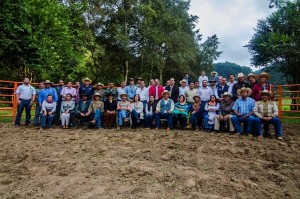Meeting attendees, from the Secretariat of Agriculture, Livestock, Rural Development, Fisheries and Food (SAGARPA) and Holistic Management
 The federal government has announced it will work with civil society organizations on a series of national pilots to combat desertification. The Secretariat of Agriculture, Livestock, Rural Development, Fisheries and Food (SAGARPA) visited the Sierra Gorda Biosphere Reserve this month to witness first-hand the positive impacts that Holistic Management and soil regeneration activities were having in the region. Following implementation, local farmers have reported dramatic increases in productivity, as well as improvements in their livestock and land's health.
The federal government has announced it will work with civil society organizations on a series of national pilots to combat desertification. The Secretariat of Agriculture, Livestock, Rural Development, Fisheries and Food (SAGARPA) visited the Sierra Gorda Biosphere Reserve this month to witness first-hand the positive impacts that Holistic Management and soil regeneration activities were having in the region. Following implementation, local farmers have reported dramatic increases in productivity, as well as improvements in their livestock and land's health.
The Holistic Management and soils regeneration programs are run as part of Grupo Ecologico Sierra Gorda IAP’s work with local farmers to reduce the environmental impact of traditional agricultural activities while still generating income from the land. Following the summit, Francisco José Gurría Treviño, General Livestock Coordinator at SAGARPA, indicated he would support the extension of these activities through pilot plots, farms, ranches and eijdos throughout Northern and Central Mexico. Should they continue to prove successful, such programs could be replicated across the entire country to reverse the effects of desertification.
With Mexico losing over 11 million acres of forest between 1990 and 2005, and most of the land in the North and Northwest seriously accelerating in erosion or already completely degraded, SAGARPA’s support was very welcome news to conservationist Martha Isabel Ruiz Corzo, GESGIAP's director, and 2013 UN Champion of the Earth winner. “We see this as a great opportunity for agricultural communities across Mexico to benefit from the programs that have already proven successful through our ‘living laboratory’,” Ms Ruiz said. “At a national level, Holistic Management not only has the potential overcome desertification, but to also offer solutions to food sovereignty, sustainable rural lifestyles, as well as mitigating the effects of global warming.”
This visit took place at Ranch Tonatico and in the GESGIAP offices in Jalpan de Serra, Central Mexico, which is now a Savory Institute Hub. Savory Hubs will represent a global community of Holistic Management practitioners. Attendees came from all over Mexico and abroad, including: Martha Isabel Ruiz Corzo as the host, GESGIAP's director; Francisco José Gurría Treviño, General Livestock Coordinator at SAGARPA and 22 other SAGARPA representatives from throughout Mexico; as well as Andrea Malmberg, Director of Research & Knowledge Management at the Savory Institute; Iván Aurelio Aguirre Ibarra, representing the LIVES, La Inmaculada, Sonora Hub in Northern Mexico; and Luis Joaquín Gómez Meza, President of the Jersey Cattle Breeding Association.
